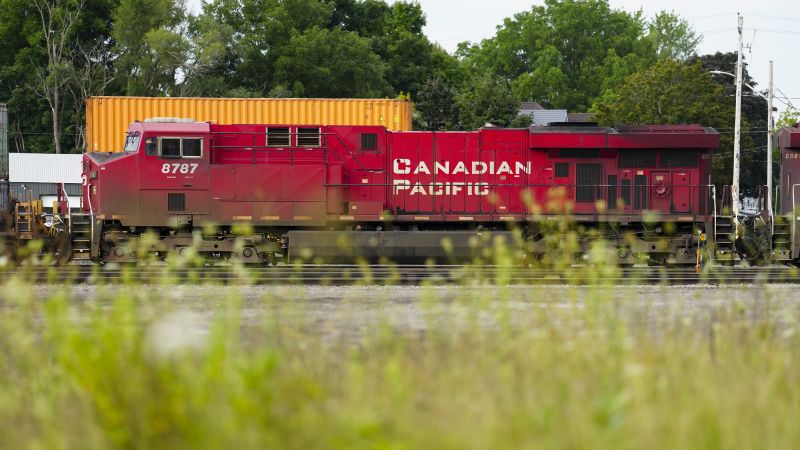New York CNN —
The Canadian government stepped in less than 17 hours after the shutdown of the country’s two largest freight railroads began, ordering binding arbitration to end a labor dispute that was threatening to cause severe disruption to both the U.S. and Canadian economies.
Prime Minister Justin Trudeau’s government had rejected such measures ahead of the shutdown, which began at 12:01 a.m. ET on Thursday. But Canada and the United States faced potential disruptions to several industries in both countries, including agriculture, autos, energy, timber and chemicals, suspensions of commuter rail services that use freight rail tracks and fears that water treatment plants in both countries would run out of chlorine needed to supply drinking water.
On Thursday afternoon, Canada’s Minister of Labour, Steve McKinnon, ordered binding arbitration with the Canada Industrial Relations Board and ordered the railroads and union members to return to work. The shutdown was initiated not by a strike by the Teamsters union, which represents about 9,000 workers at both railroads, but by a lockout of union members by management of the two railroads, Canadian National and Canadian Pacific Kansas City Southern.
The move is a victory for CN and CPKC, which had sought government intervention, saying they had no choice but to shut down the network despite the disruption it would cause because there was no way to reach an agreement with the Teamsters union.
But government intervention is a setback for the union, which has argued that the best and fairest way to resolve labor disputes is for both sides to reach an agreement at the negotiating table. The union has accused the railroad’s negotiators of greed and management demands that it says undermine rail safety and employees’ quality of life – allegations the railroad denies.
McKinnon said he assessed that both parties were at a “fundamental impasse.”
“There’s no question we’re at an impasse. The issues remain and the parties are very far apart on these issues … It’s not my job to pick sides here,” McKinnon said.
But with two state-owned railways suspending operations, “it is the government’s duty and responsibility to ensure industrial peace in this vital sector,” he told a news conference.
CPKC and the Teamsters did not immediately respond to requests for comment. CN said it plans to resume service at 6 p.m. ET.
“CN is pleased that this labor dispute is over and we can return to our role as a driving force in the economy, but is disappointed that, despite our best efforts, we were unable to reach an agreement at the negotiating table,” the company’s statement said.
Business groups including the Canada and U.S. chambers of commerce have also called for government intervention, saying the economies of both countries could be hurt by the shutdowns.
McKinnon said at a news conference Thursday that his conversations with the Americans had provided “helpful advice” because they had been through similar processes with labor disputes and strikes.
But ahead of the lockout, which began early Thursday morning, McKinnon had refused to use his powers to refer the matter to binding arbitration and force the railroad to continue operating.
The closure demonstrated how closely intertwined the Canadian and U.S. economies are. Many industries depend on the free movement of goods across the border to operate efficiently. About 30 percent of the freight carried by the two railroads crosses the U.S.-Canadian border, but without the rail services, there are hardly any truck loads available to transport the goods.
The protracted labor strikes threatened the U.S. auto industry. If Canadian factories couldn’t produce engines, transmissions, and stampings, some U.S. auto plants could be forced to temporarily close. U.S. farmers found themselves short on fertilizer near the Canadian border and U.S. water treatment plants risked running out of chlorine, which is used to purify water.
This is the first time that Canada’s two largest rail companies have simultaneously suspended operations due to labor disputes. The most recent strike in the industry was a 60-hour strike at Canadian Pacific Railway in 2022. Prior to that, there was a nine-day strike at Canadian National Railway in 2019.
This story has been updated to reflect additional background and developments.



